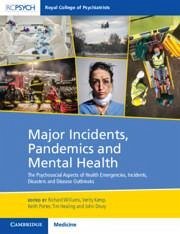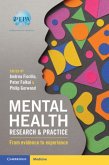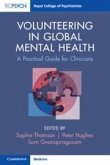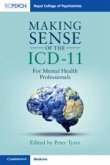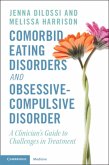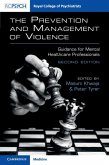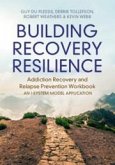Major Incidents, Pandemics and Mental Health
Herausgeber: Williams, Richard; Porter, Keith; Kemp, Verity
Major Incidents, Pandemics and Mental Health
Herausgeber: Williams, Richard; Porter, Keith; Kemp, Verity
- Broschiertes Buch
- Merkliste
- Auf die Merkliste
- Bewerten Bewerten
- Teilen
- Produkt teilen
- Produkterinnerung
- Produkterinnerung
Examines the psychosocial and mental health aspects of preparing for and responding to emergencies, major incidents, terrorist attacks, disasters, epidemics, and pandemics. Important for mental health practitioners, people working in trauma and emergency care and humanitarian care, public health practitioners, and experts in emergency planning.
Andere Kunden interessierten sich auch für
![Mental Health Research and Practice Mental Health Research and Practice]() Mental Health Research and Practice76,99 €
Mental Health Research and Practice76,99 €![Volunteering in Global Mental Health Volunteering in Global Mental Health]() Volunteering in Global Mental Health33,99 €
Volunteering in Global Mental Health33,99 €![Making Sense of the ICD-11 Making Sense of the ICD-11]() Making Sense of the ICD-1135,99 €
Making Sense of the ICD-1135,99 €![Fish's Clinical Psychopathology Fish's Clinical Psychopathology]() Patricia Casey (University College Dublin)Fish's Clinical Psychopathology35,99 €
Patricia Casey (University College Dublin)Fish's Clinical Psychopathology35,99 €![Comorbid Eating Disorders and Obsessive-Compulsive Disorder Comorbid Eating Disorders and Obsessive-Compulsive Disorder]() Jenna DiLossi (Center for Hope and Health, LLC, Pennsylvania)Comorbid Eating Disorders and Obsessive-Compulsive Disorder40,99 €
Jenna DiLossi (Center for Hope and Health, LLC, Pennsylvania)Comorbid Eating Disorders and Obsessive-Compulsive Disorder40,99 €![The Prevention and Management of Violence The Prevention and Management of Violence]() The Prevention and Management of Violence58,99 €
The Prevention and Management of Violence58,99 €![Building Recovery Resilience Building Recovery Resilience]() Guy du Plessis (Utah State University)Building Recovery Resilience24,99 €
Guy du Plessis (Utah State University)Building Recovery Resilience24,99 €-
-
-
Examines the psychosocial and mental health aspects of preparing for and responding to emergencies, major incidents, terrorist attacks, disasters, epidemics, and pandemics. Important for mental health practitioners, people working in trauma and emergency care and humanitarian care, public health practitioners, and experts in emergency planning.
Hinweis: Dieser Artikel kann nur an eine deutsche Lieferadresse ausgeliefert werden.
Hinweis: Dieser Artikel kann nur an eine deutsche Lieferadresse ausgeliefert werden.
Produktdetails
- Produktdetails
- Verlag: Cambridge University Press
- Seitenzahl: 482
- Erscheinungstermin: 1. Februar 2024
- Englisch
- Abmessung: 246mm x 189mm x 25mm
- Gewicht: 918g
- ISBN-13: 9781009011211
- ISBN-10: 1009011219
- Artikelnr.: 68505758
- Herstellerkennzeichnung
- Libri GmbH
- Europaallee 1
- 36244 Bad Hersfeld
- gpsr@libri.de
- Verlag: Cambridge University Press
- Seitenzahl: 482
- Erscheinungstermin: 1. Februar 2024
- Englisch
- Abmessung: 246mm x 189mm x 25mm
- Gewicht: 918g
- ISBN-13: 9781009011211
- ISBN-10: 1009011219
- Artikelnr.: 68505758
- Herstellerkennzeichnung
- Libri GmbH
- Europaallee 1
- 36244 Bad Hersfeld
- gpsr@libri.de
Section 1. The Nature and Impacts of 21st Century Healthcare Emergencies:
1. Emergencies, incidents, disasters, disease outbreaks and mental health:
the scope of this book Professor Richard Williams; 2. How the world views
trauma and trauma care Professor Julian Redhead; 3. How the world views the
mental health implications of traumatic events, major incidents and serious
contagious diseases Professor John Lord Alderdice; 4. Two personal
perspectives on trauma and recovery Toni Wallace and Tom Renninson; 5. How
emergencies, incidents, disasters and disease outbreaks affect people and
healthcare practitioners Dr John Stancombe, Dr Suzy Stokes, Dr Andy Wood
and Professor Richard Williams; 6. The impact of emergencies, terrorism and
disease on children and their families Professor Prathiba Chitsabesan, Dr
Brian Jacobs and Dr Raphael Kelvin; 7. The impacts of urbanising the
world's population on emergencies, incidents, disasters and disease
outbreaks Dr Tim Healing; 8. Myths about disasters Professor David E.
Alexander; 9. Primary and secondary stressors: the ways in which traumatic
events are stressful Professor Richard Williams, Dr Evangelos Ntontis,
Professor John Drury, Dr Khalifah Alfadhli and Professor Richard Amlôt; 10.
The differing challenges posed by big bang, rising tide and longer-term
incidents affecting local and dispersed populations Professor Chris Brewin,
Dr Kate Allsopp, Dr Talya Greene and Professor Richard Williams; 11. Mental
health impacts of multiple disaster exposures Professor Claire Leppold and
Dr Lennart Reifels; 12. The common ground in the mental health impacts of
emergencies, incidents, disasters, disease outbreaks and conflict and a
framework for responding to people's needs Professor Richard Williams, Dr
John Stancombe and Professor James Ryan; Section 2. Clinical Aspects of
Traumatic Injuries, Epidemics and Pandemics: 13. Advances in pre-hospital
care Professor Sir Keith Porter and Mr Emir Battaloglu; 14. The changing
face of clinical medicine in major trauma: lessons from civilian practice
and military deployments Miss J. J. Lee and Professor Sir Keith Porter; 15.
The changing face of traumatic injury: increasing experiences of
penetrating gun and knife injuries and their treatment Mr Tom Konig; 16.
Lessons from history and the epidemiology of severe epidemics and
pandemics: plague, cholera, influenza, viral haemorrhagic fevers, and
coronaviruses Dr Tim Healing; 17. The health aspects of epidemics and
pandemics Group Captain Andy Green and Dr Sharon Irvine; 18. Challenges in
managing epidemics and pandemics illustrated by Ebola and covid-19: a case
study perspective Dr Claire Bayntun; Section 3. The Role of the Public in
Emergencies: Survivors, Bystanders and 'Volunteers': 19. The role of the
public understanding of group processes in emergencies, incidents,
disasters and disease outbreaks Professor John Drury; 20. Social identity
and traumatic stress in the context of an earthquake and a pandemic:
understanding the roles of shared and isolating social experiences
Professor Orla Muldoon; 21. Mobilisation and deterioration of social
support following disasters resulting from natural and human-induced
hazards Professor Krzysztof Kaniasty and Beata Urbäska; 22. Collective
responses to terrorist attacks Dr Chris Cocking and Dr Anne Templeton; 23.
Collective psychosocial resilience as a group process following flooding:
how it arises and how groups can sustain it Dr Evangelos Ntontis and Dr
Meng Zhang; 24. Facilitating the public response to covid-19: mutual aid
and group processes Professor John Drury, Dr Evangelos Ntontis, Dr Maria
Fernandes-Jesus and Guanlan Mao; 25. The social psychology of mass casualty
decontamination in CBRN incidents Dr Holly Carter, Dr Charles Symons, Dr
Dale Weston and Professor Richard Amlôt; 26. Factors that determine wider
solidarity responses after a major incide
1. Emergencies, incidents, disasters, disease outbreaks and mental health:
the scope of this book Professor Richard Williams; 2. How the world views
trauma and trauma care Professor Julian Redhead; 3. How the world views the
mental health implications of traumatic events, major incidents and serious
contagious diseases Professor John Lord Alderdice; 4. Two personal
perspectives on trauma and recovery Toni Wallace and Tom Renninson; 5. How
emergencies, incidents, disasters and disease outbreaks affect people and
healthcare practitioners Dr John Stancombe, Dr Suzy Stokes, Dr Andy Wood
and Professor Richard Williams; 6. The impact of emergencies, terrorism and
disease on children and their families Professor Prathiba Chitsabesan, Dr
Brian Jacobs and Dr Raphael Kelvin; 7. The impacts of urbanising the
world's population on emergencies, incidents, disasters and disease
outbreaks Dr Tim Healing; 8. Myths about disasters Professor David E.
Alexander; 9. Primary and secondary stressors: the ways in which traumatic
events are stressful Professor Richard Williams, Dr Evangelos Ntontis,
Professor John Drury, Dr Khalifah Alfadhli and Professor Richard Amlôt; 10.
The differing challenges posed by big bang, rising tide and longer-term
incidents affecting local and dispersed populations Professor Chris Brewin,
Dr Kate Allsopp, Dr Talya Greene and Professor Richard Williams; 11. Mental
health impacts of multiple disaster exposures Professor Claire Leppold and
Dr Lennart Reifels; 12. The common ground in the mental health impacts of
emergencies, incidents, disasters, disease outbreaks and conflict and a
framework for responding to people's needs Professor Richard Williams, Dr
John Stancombe and Professor James Ryan; Section 2. Clinical Aspects of
Traumatic Injuries, Epidemics and Pandemics: 13. Advances in pre-hospital
care Professor Sir Keith Porter and Mr Emir Battaloglu; 14. The changing
face of clinical medicine in major trauma: lessons from civilian practice
and military deployments Miss J. J. Lee and Professor Sir Keith Porter; 15.
The changing face of traumatic injury: increasing experiences of
penetrating gun and knife injuries and their treatment Mr Tom Konig; 16.
Lessons from history and the epidemiology of severe epidemics and
pandemics: plague, cholera, influenza, viral haemorrhagic fevers, and
coronaviruses Dr Tim Healing; 17. The health aspects of epidemics and
pandemics Group Captain Andy Green and Dr Sharon Irvine; 18. Challenges in
managing epidemics and pandemics illustrated by Ebola and covid-19: a case
study perspective Dr Claire Bayntun; Section 3. The Role of the Public in
Emergencies: Survivors, Bystanders and 'Volunteers': 19. The role of the
public understanding of group processes in emergencies, incidents,
disasters and disease outbreaks Professor John Drury; 20. Social identity
and traumatic stress in the context of an earthquake and a pandemic:
understanding the roles of shared and isolating social experiences
Professor Orla Muldoon; 21. Mobilisation and deterioration of social
support following disasters resulting from natural and human-induced
hazards Professor Krzysztof Kaniasty and Beata Urbäska; 22. Collective
responses to terrorist attacks Dr Chris Cocking and Dr Anne Templeton; 23.
Collective psychosocial resilience as a group process following flooding:
how it arises and how groups can sustain it Dr Evangelos Ntontis and Dr
Meng Zhang; 24. Facilitating the public response to covid-19: mutual aid
and group processes Professor John Drury, Dr Evangelos Ntontis, Dr Maria
Fernandes-Jesus and Guanlan Mao; 25. The social psychology of mass casualty
decontamination in CBRN incidents Dr Holly Carter, Dr Charles Symons, Dr
Dale Weston and Professor Richard Amlôt; 26. Factors that determine wider
solidarity responses after a major incide
Section 1. The Nature and Impacts of 21st Century Healthcare Emergencies:
1. Emergencies, incidents, disasters, disease outbreaks and mental health:
the scope of this book Professor Richard Williams; 2. How the world views
trauma and trauma care Professor Julian Redhead; 3. How the world views the
mental health implications of traumatic events, major incidents and serious
contagious diseases Professor John Lord Alderdice; 4. Two personal
perspectives on trauma and recovery Toni Wallace and Tom Renninson; 5. How
emergencies, incidents, disasters and disease outbreaks affect people and
healthcare practitioners Dr John Stancombe, Dr Suzy Stokes, Dr Andy Wood
and Professor Richard Williams; 6. The impact of emergencies, terrorism and
disease on children and their families Professor Prathiba Chitsabesan, Dr
Brian Jacobs and Dr Raphael Kelvin; 7. The impacts of urbanising the
world's population on emergencies, incidents, disasters and disease
outbreaks Dr Tim Healing; 8. Myths about disasters Professor David E.
Alexander; 9. Primary and secondary stressors: the ways in which traumatic
events are stressful Professor Richard Williams, Dr Evangelos Ntontis,
Professor John Drury, Dr Khalifah Alfadhli and Professor Richard Amlôt; 10.
The differing challenges posed by big bang, rising tide and longer-term
incidents affecting local and dispersed populations Professor Chris Brewin,
Dr Kate Allsopp, Dr Talya Greene and Professor Richard Williams; 11. Mental
health impacts of multiple disaster exposures Professor Claire Leppold and
Dr Lennart Reifels; 12. The common ground in the mental health impacts of
emergencies, incidents, disasters, disease outbreaks and conflict and a
framework for responding to people's needs Professor Richard Williams, Dr
John Stancombe and Professor James Ryan; Section 2. Clinical Aspects of
Traumatic Injuries, Epidemics and Pandemics: 13. Advances in pre-hospital
care Professor Sir Keith Porter and Mr Emir Battaloglu; 14. The changing
face of clinical medicine in major trauma: lessons from civilian practice
and military deployments Miss J. J. Lee and Professor Sir Keith Porter; 15.
The changing face of traumatic injury: increasing experiences of
penetrating gun and knife injuries and their treatment Mr Tom Konig; 16.
Lessons from history and the epidemiology of severe epidemics and
pandemics: plague, cholera, influenza, viral haemorrhagic fevers, and
coronaviruses Dr Tim Healing; 17. The health aspects of epidemics and
pandemics Group Captain Andy Green and Dr Sharon Irvine; 18. Challenges in
managing epidemics and pandemics illustrated by Ebola and covid-19: a case
study perspective Dr Claire Bayntun; Section 3. The Role of the Public in
Emergencies: Survivors, Bystanders and 'Volunteers': 19. The role of the
public understanding of group processes in emergencies, incidents,
disasters and disease outbreaks Professor John Drury; 20. Social identity
and traumatic stress in the context of an earthquake and a pandemic:
understanding the roles of shared and isolating social experiences
Professor Orla Muldoon; 21. Mobilisation and deterioration of social
support following disasters resulting from natural and human-induced
hazards Professor Krzysztof Kaniasty and Beata Urbäska; 22. Collective
responses to terrorist attacks Dr Chris Cocking and Dr Anne Templeton; 23.
Collective psychosocial resilience as a group process following flooding:
how it arises and how groups can sustain it Dr Evangelos Ntontis and Dr
Meng Zhang; 24. Facilitating the public response to covid-19: mutual aid
and group processes Professor John Drury, Dr Evangelos Ntontis, Dr Maria
Fernandes-Jesus and Guanlan Mao; 25. The social psychology of mass casualty
decontamination in CBRN incidents Dr Holly Carter, Dr Charles Symons, Dr
Dale Weston and Professor Richard Amlôt; 26. Factors that determine wider
solidarity responses after a major incide
1. Emergencies, incidents, disasters, disease outbreaks and mental health:
the scope of this book Professor Richard Williams; 2. How the world views
trauma and trauma care Professor Julian Redhead; 3. How the world views the
mental health implications of traumatic events, major incidents and serious
contagious diseases Professor John Lord Alderdice; 4. Two personal
perspectives on trauma and recovery Toni Wallace and Tom Renninson; 5. How
emergencies, incidents, disasters and disease outbreaks affect people and
healthcare practitioners Dr John Stancombe, Dr Suzy Stokes, Dr Andy Wood
and Professor Richard Williams; 6. The impact of emergencies, terrorism and
disease on children and their families Professor Prathiba Chitsabesan, Dr
Brian Jacobs and Dr Raphael Kelvin; 7. The impacts of urbanising the
world's population on emergencies, incidents, disasters and disease
outbreaks Dr Tim Healing; 8. Myths about disasters Professor David E.
Alexander; 9. Primary and secondary stressors: the ways in which traumatic
events are stressful Professor Richard Williams, Dr Evangelos Ntontis,
Professor John Drury, Dr Khalifah Alfadhli and Professor Richard Amlôt; 10.
The differing challenges posed by big bang, rising tide and longer-term
incidents affecting local and dispersed populations Professor Chris Brewin,
Dr Kate Allsopp, Dr Talya Greene and Professor Richard Williams; 11. Mental
health impacts of multiple disaster exposures Professor Claire Leppold and
Dr Lennart Reifels; 12. The common ground in the mental health impacts of
emergencies, incidents, disasters, disease outbreaks and conflict and a
framework for responding to people's needs Professor Richard Williams, Dr
John Stancombe and Professor James Ryan; Section 2. Clinical Aspects of
Traumatic Injuries, Epidemics and Pandemics: 13. Advances in pre-hospital
care Professor Sir Keith Porter and Mr Emir Battaloglu; 14. The changing
face of clinical medicine in major trauma: lessons from civilian practice
and military deployments Miss J. J. Lee and Professor Sir Keith Porter; 15.
The changing face of traumatic injury: increasing experiences of
penetrating gun and knife injuries and their treatment Mr Tom Konig; 16.
Lessons from history and the epidemiology of severe epidemics and
pandemics: plague, cholera, influenza, viral haemorrhagic fevers, and
coronaviruses Dr Tim Healing; 17. The health aspects of epidemics and
pandemics Group Captain Andy Green and Dr Sharon Irvine; 18. Challenges in
managing epidemics and pandemics illustrated by Ebola and covid-19: a case
study perspective Dr Claire Bayntun; Section 3. The Role of the Public in
Emergencies: Survivors, Bystanders and 'Volunteers': 19. The role of the
public understanding of group processes in emergencies, incidents,
disasters and disease outbreaks Professor John Drury; 20. Social identity
and traumatic stress in the context of an earthquake and a pandemic:
understanding the roles of shared and isolating social experiences
Professor Orla Muldoon; 21. Mobilisation and deterioration of social
support following disasters resulting from natural and human-induced
hazards Professor Krzysztof Kaniasty and Beata Urbäska; 22. Collective
responses to terrorist attacks Dr Chris Cocking and Dr Anne Templeton; 23.
Collective psychosocial resilience as a group process following flooding:
how it arises and how groups can sustain it Dr Evangelos Ntontis and Dr
Meng Zhang; 24. Facilitating the public response to covid-19: mutual aid
and group processes Professor John Drury, Dr Evangelos Ntontis, Dr Maria
Fernandes-Jesus and Guanlan Mao; 25. The social psychology of mass casualty
decontamination in CBRN incidents Dr Holly Carter, Dr Charles Symons, Dr
Dale Weston and Professor Richard Amlôt; 26. Factors that determine wider
solidarity responses after a major incide

